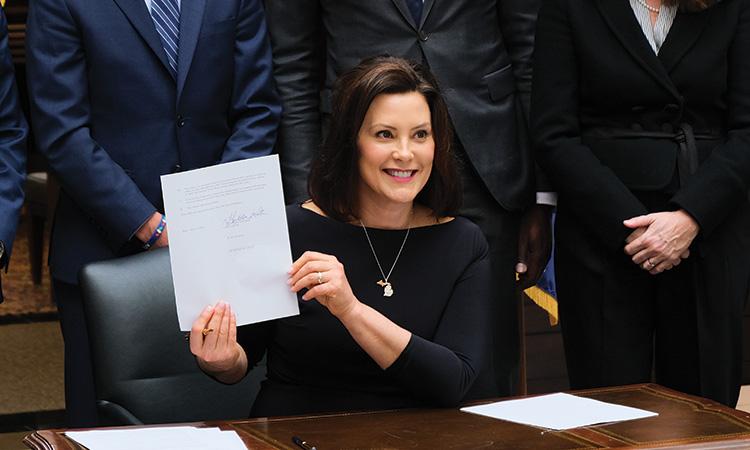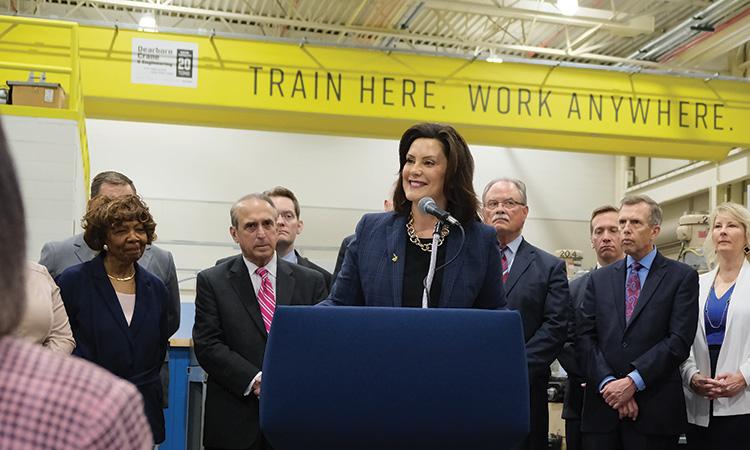Gov. Gretchen Whitmer - Rising to the Challenge

Gov. Gretchen Whitmer - Rising to the Challenge
With a passion for public service and a fierce dedication to challenging the status quo, Gov. Gretchen E. Whitmer is committed to beefing up education and career opportunities, improving access to health care and protecting our state’s precious natural resources.
October 1, 2019Something unexpected happened on Gretchen E. Whitmer’s way to becoming a sportscaster. She landed a college internship at the state capitol.
“That changed the whole trajectory for me. I fell in love with public policy, and that was the inspiration for going to law school and eventually getting into public service,” Whitmer, now Michigan’s governor, said in a recent phone interview on her way back to Lansing from a Camp Grayling veterans’ memorial service.
She grew up in Grand Rapids and is the namesake of both grandmothers, Gretchen and Esther.
“I feel very fortunate to have their names because they were both fiercely independent women who were incredible mentors and people for me to look up to,” she said.
The state’s 49th governor, and only the second woman to hold Michigan’s highest office, she’s carrying on her parents’ legacy and inspiring successive generations of young women eager to follow her lead.
On a less serious note, she may be the first of her kind for whom a local craft beer is named. And she uses a contemporary smart phone tool to counteract stress.
“I actually have Buddify, an app of short meditations. It’s really helpful, especially on the go. I can tune in for a five-or 10-minute session that helps keep me centered,” she said in an upbeat voice.
Spartan: How does it feel to enter our state’s capitol building as Michigan’s governor?
G.W.: It can be incredibly inspiring and humbling at the same time. The governor’s office in the capitol, which is mostly ceremonial (my working offices are across the street in the Romney Building) are an exquisitely restored set of three rooms. I’m surrounded by pictures of former governors from many, many decades ago. Most are white men with a lot of facial hair. I always look up and think about how much has changed, and yet some of the important ceremonies and important values we share have remained the same. It’s a reminder of how important it is to acknowledge our similarities, but always strive to continue to push for innovation, making sure we’re doing cutting-edge things here in Michigan.
Spartan: What do you believe are the biggest threats our state is facing right now?
G.W.: Well, I think the lack of investment in the education of our people and the infrastructure we all rely on is the most important work we have to do. Our roads and our bridges are dangerous, and it’s getting more dangerous and more expensive every day we don’t address it. We’ve shortchanged everything from our universities to our K-12 system to triage this aging infrastruc-ture. Consequently, we’re behind where we should be in terms of outcomes for kids, in terms of the skills gap, and of course in terms of infrastructure that supports a modern mobility system and modern-day economy. These are the biggest challenges—and they’re not just challenges for us as a state, or for our people as individuals, but they’re homeland security challenges as well. While Michigan’s educated population has been boosted over the years, we still have too few people today with the degrees and certificates to be successful. That poses a number of challenges for us. That’s why I’m staying so focused on it. The good news is none of this is inherently partisan, and I’m hopeful that even in a divided government, we can find our common ground around solutions on these fronts.
Spartan: Do you think there’s a benefit to being a woman in your role?
G.W.: Well, I do think that women lead differently. Studies have shown that women in public service, in the political realm, spend more time on issues like education and health care, and get less concerned about getting credit (while being) more concerned about making sure we have results that are important. I think as women, we have vital voices in how public policies are made, but also in terms of showing other women that we are up to taking on executive positions and leadership positions. I hear from parents of daughters all the time on how much they like having a chief executive who is female to show their daughters that anything’s possible.
Spartan: What’s the most difficult part of your job?
G.W.: The part that I think is hard for anyone to appreciate includes some of the heavy duties that come with being, for instance, the Commander in Chief of the National Guard. As we speak, I’m just leaving Camp Grayling, and we had a memorial service for the 88 Michigan members who passed away this past year. Some passed away because they were currently serving in combat, and (there were) others who had previously served and who’d died of natural causes. Making phone calls to families and supporting our people in the military is an aspect of my role that (perhaps) the average person may not see. It comes with a great responsibility and can be challenging when talking to a family whose loved one has paid the ultimate sacrifice for our country. I served in the legislature for 14 years, and I knew a lot of aspects of this job...but this important role is not one that receives a lot of attention.
Spartan: What would a successful four years look like to you?
G.W.: Well, I think success will be measured in terms of whether we’ve started to address our infrastructure issues. Will Michiganders have confidence in the quality of the water they’re giving their families at the dinner table? And have we made strides in closing the skills gap and raising quality of life for people in this state? Finally, will I have contributed in a positive way to the perception of public service and to reminding folks that we’re Michiganders first and foremost, before partisans, and will there be good jobs so the people of our state can say their governor was looking out for them?
Spartan: Tell us about an “average” workday. Do you have a driver that allows you to work between appearances?
G.W.: The average day starts around 5 a.m. As governor, I can spend a 12-hour day in the office, or I am frequently out on the road. Usually I jump in the car and we’re headed to the Romney Building, where I have my executive team meeting, and then I’m often hitting the road either to Detroit or Grand Rapids or elsewhere in the state. The Michigan State Police are my detail so I’m always in safe hands. They drive and help me out with logistics in and out of everywhere. That helps ensure I can be very productive during my day—whether I’m on the phone, (or) attending regular meetings and checking in with my cabinet. There are always unpredictable things happening around the state and it’s really important I keep connected with my team.
I think as women, we have vital voices in how public policies are made, but also in terms of showing other women that we are up to taking on executive positions and leadership positions. I hear from parents of daughters all the time on how much they like having a chief executive who is female to show their daughters that anything’s possible.
Spartan: What’s at the top of your personal to-do list?
G.W.: I try to maintain a daily routine that includes getting some exercise every day. I drink my green smoothie, take my vitamins and spend some time with my family. Those are all important pieces to maintain in the schedule and help me address…the many different issues I respond to as leader of our state.
Spartan: Are there sacred activities you try to protect related to family time?
G.W.: We do like to have dinner together a couple of times a week. We spend our holidays together. And my husband and I are avid walkers. He walks every single day. I’m not home enough to do it with him every day, but we definitely try to make that a priority. Just getting out in the fresh air and spending time together is something I really love, and sitting by a campfire, as well. My family is what centers me. My parents were incredible role models and supporters. My children are what keep me focused on the future and the work that we have to do. And I feel very fortunate to have called Michigan home my whole life. It’s a wonderful place to live, to work, to raise a family and to host an incredible university like MSU.
Spartan: How did Michigan State University influence you?
G.W.: My years at MSU were some of the best of my life. As a freshman undergrad, I was thinking I would become a sports broadcaster, (but) an internship in the capitol kind of changed the whole trajectory for me. After earning my bachelor’s degree at MSU, I went to work at the capitol and ultimately decided to go to law school. I got my law degree, and I was practicing law, and that’s when the opportunity to run for the Michigan House of Representatives came up. During all my years in the legislature, I was fortunate to represent East Lansing and consequently my alma mater. After earning three degrees there, I think the relationships and the education, the perspective I got from my time at MSU, is something that has benefited me as a mom, as a Michigander and as a public servant.
Spartan: What does it mean to be a Spartan?
G.W.: I am proud to be a Michigan State Spartan. I think we’ve got an incredible nation of Spartans around the world who are connected and fiercely identify with the university and represent grit, determination and are problem solvers. It’s something that is always with me in everything I do, and it’s why I will always be so invested in making sure that Michigan State University is successful and that current Spartans and future Spartans are as well.
Hear more from Governor Whitmer:











